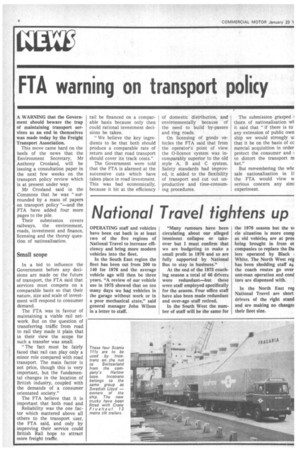FTA FTA warning on transport policy A WARNING that the
Page 6

If you've noticed an error in this article please click here to report it so we can fix it.
Government should beware the trap of maintaining transport services as an end in themselves was made today by the Freight Transport Association.
This move came hard on the heels of the news that the Environment Secretary, Mr Anthony Crosland, will be issuing a consultation paper in the next few weeks on the transport policy review which is at present under way.
Mr Crosland said in the Commons that he was "surrounded by a mass of papers on transport policy "—and the FTA have added four more pages to the pile.
Their submission covers railways, the environment, roads, investment and finance, licensing and the thorny question of nationalisation.
Small scope
In a bid to influence the Government before any decisions are made on the future of transport, the FTA said that services must compete on a comparable basis so that their nature, size and scale of investment will respond to consumer demand.
The FTA was in favour of maintaining a viable rail network. But on the question of transferring traffic from road to rail they made it plain that in their view the scope for such a transfer was small.
"The fact must be fairly faced that 'rail can play only a minor role compared with road transport. The main factor is not price, though this is very important, but the fundamental changes in the location of British industry, coupled with the demands of a consumer orientated society."
The FTA believe that it is important that both road and Reliability was the one factor which mattered above all others to the transport user, the FTA said, and only by improving their service could British Rail hope to attract more freight traffic. rail be financed on a comparable basis because only then could rational investment decisions be taken.
" We believe the key ingredients to be that both should produce a comparable rate of return and that road transport should cover its track costs."
The Government were told that the FTA is alarmed at the successive cuts which have taken place in road investment. This was bad economically, because it hit at the efficiency of domestic distribution, and environmentally because of the need to build by-passes and ring roads.
On licensing of goods vehicles the FTA said that from the operator's point of view the 0-licence system was incomparably superior to the old style A, B and C system, Safety standards had improved, it added to the flexibility of transport and cut out un'productive and time-consuming procedures. The submission ' grasped thorn of nationalisation wi it said that " if there is to any extension of public own ship we would strongly ui that it be on the basis of cc mercial acquisition in order protect the consumer and I to distort the transport m ket."
But remembering the whc sale nationalisation in 1! the FTA would view w serious concern any simi experiment.
















































































